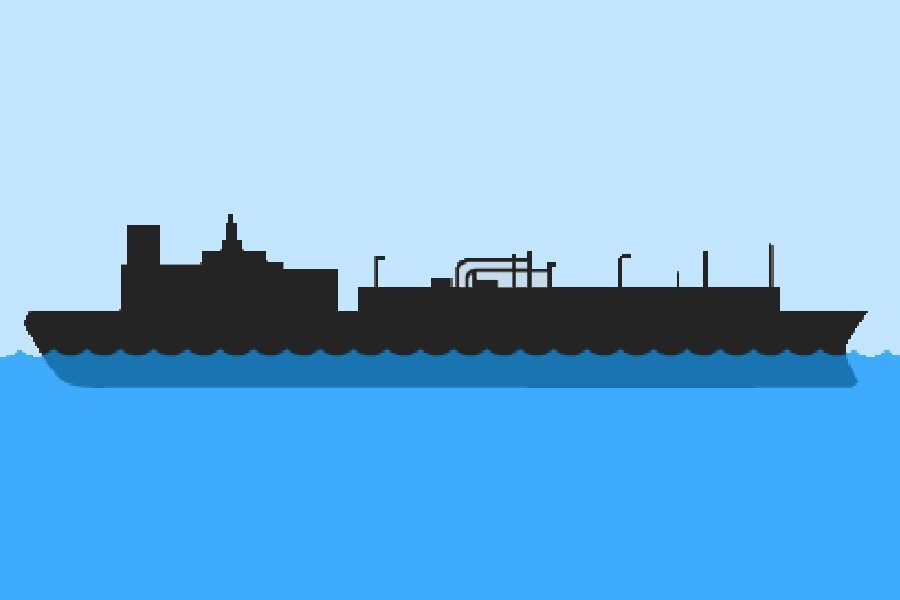
Published :
Updated :

Although no major depressions have formed over the Bay of Bengal in recent weeks, Bangladesh continues to face difficulties in unloading imported liquefied natural gas (LNG) at floating storage and regasification units (FSRUs) due to rough seas and high winds.
Officials said at least two LNG cargoes were delayed in September, as ship-to-ship (STS) transfers to the FSRUs had to be suspended for safety reasons.
The state-run Rupantarita Prakritik Gas Company Ltd (RPGCL) managed to avert any supply disruptions, though it remains unclear whether the delays incurred demurrage costs.
The disruptions underline the vulnerability of Bangladesh's LNG supply chain to seasonal weather patterns, which are expected to persist through October as forecasters warn of more low-pressure systems over the Bay.
A senior Petrobangla official told The Financial Express on Thursday that one vessel had to wait at least three days for favourable weather, while the other was delayed by a couple of days.
State-run RPGCL managed the situation efficiently to prevent any disruption in LNG regasification. However, the official could not confirm whether Petrobangla incurred demurrage charges due to the delays.
According to the Bangladesh Meteorological Department (BMD), three low-pressure areas have recently formed over the Bay of Bengal, one of which intensified into a depression.
For October's long-term forecast, the BMD has predicted up to three similar systems, with at least one likely to develop into a depression or cyclone.
STS transfers of LNG are typically suspended during adverse weather conditions, including high winds, rough seas, and poor visibility, the Petrobangla official explained.
The maximum allowable wind speed for safe transfers is 20 knots, as stronger winds can destabilise mooring lines, damage transfer hoses, and make vessel positioning hazardous.
Wave heights must not exceed 1.5 to 2.0 metres, while visibility should remain between 0.5 and 1 nautical mile to allow for safe manoeuvring and emergency response, he added.
Officials noted that LNG unloading and regasification often face interruptions during the monsoon season, when the sea remains rough. In late May, several LNG vessels were unable to complete STS transfers because of turbulent conditions in the Bay.
Petrobangla had to anchor the vessels at the pilot boarding station (PBS), located 10-12 kilometres from the FSRUs, for safety reasons, Petrobangla Chairman Md Rezanur Rahman told The Financial Express at the time.
One vessel, carrying LNG from Oman's OQ Trading, managed to transfer about 85 per cent of its cargo to an FSRU near Moheshkhali Island before deteriorating sea conditions forced it to return to the PBS with the remaining 15 per cent still onboard.
Another vessel, operated by Gunvor Singapore Pte Ltd, arrived near the FSRUs in the early hours of May 28 but was redirected to the PBS without unloading any LNG due to severe weather, Mr Rahman added.
Official BMD data confirmed that a low-pressure system over the north-west Bay and adjacent areas intensified into a depression in May.
Market observers pointed out that Bangladesh's LNG infrastructure also suffered during last year's monsoon, when one of the country's two floating LNG terminals sustained damage from Cyclone Remal in late May.
Cyclone Mocha in 2023 caused similar disruptions to LNG imports and regasification, which affected power generation, industrial activity, and gas supply to consumers.
Natural gas output in Bangladesh typically declines during periods of bad weather, hitting supplies to industries, power plants, fertiliser factories, and households.
As of 8 October 2025, the country's total gas production stood at around 2,721 million cubic feet per day (mmcfd), including 927 mmcfd of regasified LNG, according to Petrobangla data.
azizjst@yahoo.com


 For all latest news, follow The Financial Express Google News channel.
For all latest news, follow The Financial Express Google News channel.